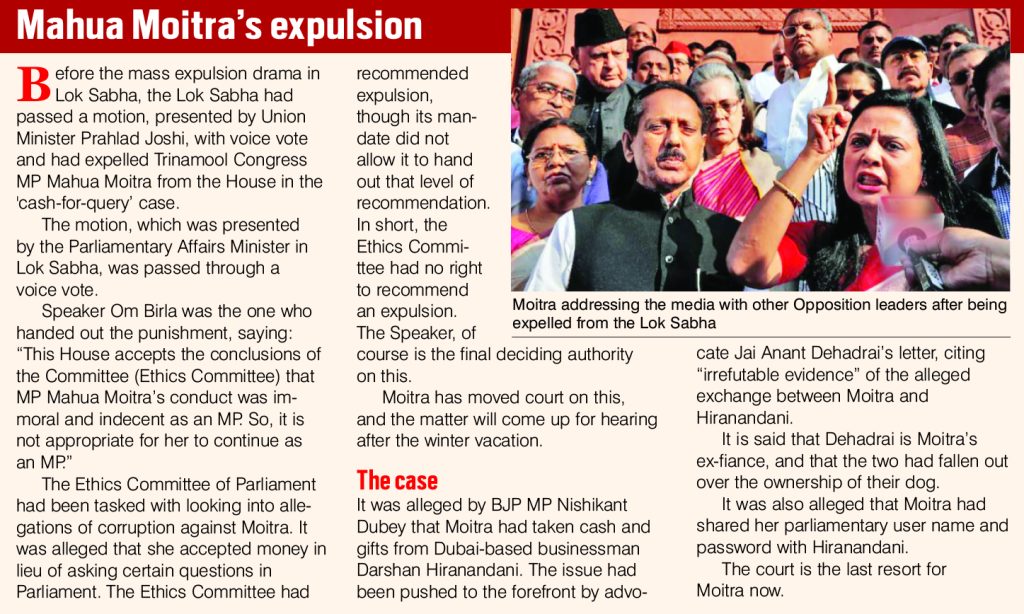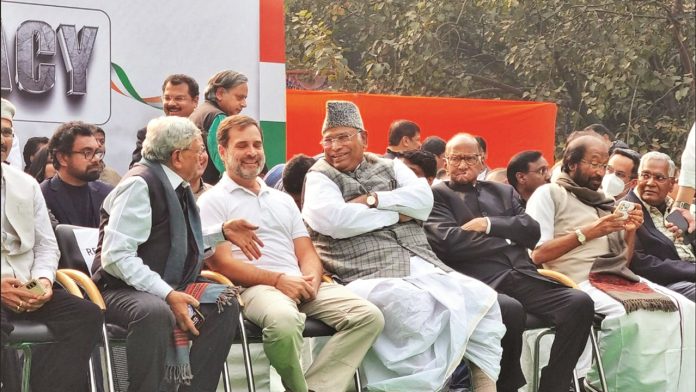Indian Parliament has set a dubious record in suspending 146 Opposition MPs from its Winter Session. That means the voices of crores of voters and even more citizens have been deprived the ear of the top decision-making body of the country
By Sujit Bhar
In a country as large and as populous as India, representative democracy works better than its participatory alternative. Hence, every Member of Parliament’s presence in Parliament assumes huge importance. MPs, even if they belong to the Opposition, are legitimate, and represent the voice of the section of the population of the country that has voted him/her to Parliament. Ejecting an MP from Parliament is, in effect, ejecting the voice of that many ordinary people of the country from the very place that their representation should have earned best value.
Expulsions often become necessary, though, because the serious nature of business being conducted in Parliament (either House) cannot be disrupted at the whim of an MP or MPs, for frivolous reasons. The decorum of the House has to be maintained at all costs, and that is why a lot of rules are in place to see to it that the main and very purpose of the House is not hampered.

However, it has been seen that when the treasury benches assume disproportionate power, rules are bent, bills are rammed through without much discussion, many through voice votes even before proper debate has happened and the idea of decorum seems to apply only to the Opposition benches. This probably is the situation in Parliament today, where the Bharatiya Janata Party (BJP) holds brute majority.
Yet, by the scale of any democratic principle, the voice of the Opposition MPs is important and deserves the ears of the House. Expulsions have to be carefully executed and cannot be done en masse as happened during this Winter Session.
The case of representation
The minimum representation (population) of an MP is more than 64,000 (Lakshwadeep) to over 27.5 lakh (Rajasthan). For Uttar Pradesh, that number is around 25 lakh and for West Bengal is around 22 lakh. On average, an Indian parliamentarian represents constituencies with more than 15 lakh eligible voters and over 25 lakh citizens.
These are humongous numbers and that is why the success of democracy in India rests on the actions of the government, as well as on the Opposition. The Opposition is not an adjunct, but a body that has legitimate rights inside Parliament.
With this as the backdrop, take a while to absorb this scenario. As Union Home Minister Amit Shah stood in a spanking new Parliament House, explaining the attributes of the criminal law bills that were supposed to replace three older bills, the supposed “debate” was not happening. This was because the members who were supposed to oppose the motion in the debate with critical questions and observations, had been expelled by the Speaker on several previous days.
So, when the Lok Sabha passed the three criminal laws—the Bharatiya Nyaya (Second) Sanhita, the Bharatiya Nagarik Suraksha (Second) Sanhita and the Bharatiya Sakshya (Second) Bill—97 Opposition MPs were restricted to protesting outside the Lower House, being expelled amid protests over Parliament security breach. Opposition members still in the House were supposed to be in no position to create any level of disruptive activity that would have irked Speaker Om Birla. Yet, they were not found just squirming in their seats.
The result: Three more MPs were expelled before the Session was adjourned sine die. The total expulsions from both houses stood at an astounding 146.
The very purpose of a Parliamentary debate was defeated. This means that if the MPs who had been expelled had brought with them critical voices from their constituencies to place before the Speaker, they could not.
According to Opposition members, the total number of Opposition MPs expelled from Parliament’s 2023 Winter Session wasn’t just a dubious record, but a gag on privileges.
The MPs were suspended, because they had staged vociferous protests in the well of both Houses, demanding a statement by Amit Shah on the security breach in Parliament the week before. The MPs were also carrying placards, shouting slogans. Shah had, interestingly, made a statement, but that was not in Parliament; it was to a reporter of a television news channel. That had irked the Opposition MPs even further.
A precedent
If there is at all a need to find a precedent of mass expulsion, then the only act that came anywhere close was in 1989.
In 1989, when Rajiv Gandhi was Prime Minister, 63 MPs were suspended, because the MPs demanded the tabling of the Justice Thakkar Committee report on the assassination of Prime Minister Indira Gandhi. It is said that in the report RK Dhawan, who was close to Rajiv Gandhi, was mentioned. This was the reason, it was said, why Rajiv Gandhi did not want to table the report and the protest ensued, resulting in expulsions.
Those expelled on that instance were, however, brought back quickly, some in a matter of days, and all within a week or so, after they apologised.
Nowhere else in the history of independent India’s parliamentary records have such mass expulsions happened.
Within all the comments from the treasury benches and from those expelled, Congress MP Adhir Ranjan Chowdhury’s (West Bengal) comment strikes at the heart of it all. He had said within the House, before being himself expelled: “Sir, a very tall and senior leader of this House, whom I hold in high regard, Shri Arun Jaitley, used to say: ‘Disruption is also a legitimate weapon of democracy’.”
Arun Jaitley was an eminent lawyer and one of the tallest leaders of the BJP, after Narendra Modi and Amit Shah. What he said was a legitimate expression of a statesman.
When expelled MP Karti Chidambaram, of the Congress said that “This (Indian Parliament) is going to resemble the North Korean Assembly,” he surely was exaggerating, but it is difficult to find similarities in normal democracies around the world.
The UK example
Take the House of Commons of the British Parliament, for example.
Starting from July 2, 1931, when MP John McGovern of the Independent Labour Party was expelled for the remainder of the session for “disregarding ruling of the chair and requiring force to be removed when initially ordered to withdraw,” to October 25, 2023, when MP Peter Bone (Independent) was suspended by the Conservative whip, very few instances of expulsions have been recorded. Bone was recalled after 30 days by consultants, his expulsion was for bullying and sexual misconduct towards a staff member.
Not that the Indian parliamentary system has to follow the example of the British system, but a democracy has to hear both sides of a story. It is a democracy’s bounden duty. To that extent the idea of protests itself may become an anathema.
MP Adhir Chowdhury also said: “This government has reached the apex of dictatorship. They have the majority, and they are wielding the stick of power. They want to run Parliament like a party office. But that cannot happen. We were eager for a discussion. The productivity of Parliament before December 13 is for all to see. It seems they find it easier to talk to the media, but are scared to speak in Parliament.”
In the Rajya Sabha, Vice-President and Chairman Jagdeep Dhankhar said: “Many members are deliberately ignoring the bench. House is not functioning due to disruption.”
The Manipur issue
Earlier, when the Manipur ethnic violence was at its peak, Opposition members had cried in Parliament for a statement from Prime Minister Narendra Modi. When that did not happen, the Opposition was forced into calling for a no-confidence motion against the government.
Considering the brute majority of the treasury benches, the result was a no brainer, and that was what happened. But in the end Modi did deliver his speech.
Possibly that was the memory that had motivated the Opposition MPs to protest this time around as well. Political implications apart, a breach of Parliament security, that too on the 22nd anniversary of Parliament attack, was a serious matter. It has been said that security systems at the new Parliament House are far from satisfactory and this will probably be looked into.
Meanwhile, the Winter Session of Parliament was a cold, unfriendly affair.


